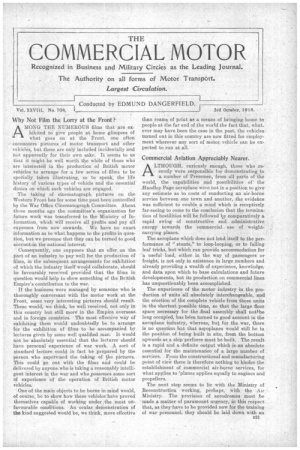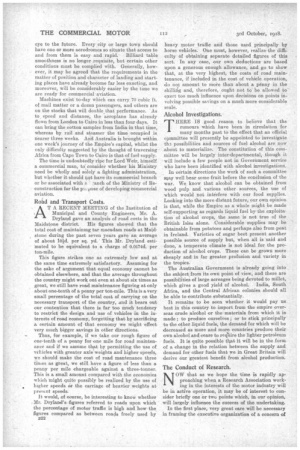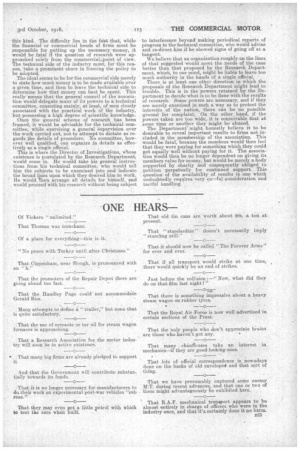Why Not Film the Lorry at the Front?
Page 1

Page 2

Page 3

If you've noticed an error in this article please click here to report it so we can fix it.
AMONG THE NUMEROUS films that are exhibited to give people at home glimpses of what goes on at the Front, one often encounters pictures of motor transport and other vehicles, but these are only included incidentally and not apparently for their own sake. It seems to us that it might be well worth the while of those who are interested in the production of British motor vehicles to arrange for a few series of films to be. specially taken illustrating, so to speak, the life history of various types of vehicle and the essential duties on which such vehicles are engaged.
The taking of cinematograph pictures on the Western Front has for some time past been controlled by the War Office Cinematograph Committee. About three months ago the committee's organization for future work was transferred to the Ministry of In formation, which will receive all profits and pay all expenses from now onwards. We have no exact information as to what happens to the profits in question, but we presume that they can be turned to good account,in the national interest.
Consequently, one supposes that an offer on the part of an industry to pay well for the production of films, in the subsequent arrangements for exhibition of which the industry itself would collaborate, should be favourably received provided that the films in question would help to show something of the British Empire's contribution to the war.
• If the business were managed by someone who is thoroughly conversant with the motor work at the Front, some very interesting pictures should result.
These would, we think, be well received, not only in this country but still mord in the Empire overseas and in foreign countries. The most effective way of exhibiting them would undoubtedly be to arrange for the exhibition of films to be accompanied by lectures given by some well qualified man. It would not be absolutely essential that the lecturer should have personal experience of war work. A sort of standard lecture could in fact be prepared by the person who supervised the taking of he pictures. This could go out with the films and could he delivered by anyone who is taking a reasonably intelligent interest in the war and who possesses some sort of experience of the operation of British motor vehicles.
One of the main objects to he borne in mind would, of course, be to show how these vehicles have proved themselves capable of working under ,the most unfavourable conditions. An ocular, .deinanstration of the kind suggested would be, we think, more effective than reams of priot as .a means of bringing home to people at the far end of the world the fact that, what_ ever may have been the case in the past, the vehiclesturned out in this country are now fitted for employment wherever any sort of motor vehiete can be expected to run at all.
Commercial Aviation Appreciably Nearer.
LTHOUGH, curiously enough, those who recently were responsible for demonstrating to a number of Pressmen, from all parts of the world, the capabilities and possibilities of the Handley Page aeroplane were not in a position to give any estimate as to costs of conducting an air-borne service between one town and another, the evidehce was sufficient to enable a. mind which is receptively far-seeing to come to the conclusion that the termination of hostilities will be followed la comparatively a rapid swing of constructive and administrative energy towards the commercial use of weightcarrying planes.
The aeroplane which does not lend itself to the per formance of "stunts," to loop-looping, or to falling leaf tricks, but which can provide accommodation for "a useful load, either in the way of passengers or freight, is not only in existence in. large numbers and already providing a wealth of experience, knowledge, and data upon which to base calculations and future developments, but its production on commercial lines has unquestionably been accomplished.
The experience of the motor industry in the production of units all absolutely interchangeable, and the erection of the complete vehicle from those units in the shortest possible time, so that the large floor space necessary for the final assembly shall notlbe long occupied, has been turned to good account in the aeroplane industry, whereas, bi.4 for the war, there is no question but that aeroplanes would still be in the position of being built in situ, from the bottom upwards as a ship-perforce must be built. The result is a rapid and a definite output which is an absolute essential for the maintenance of a large number of services. From the constructional and manufacturing point of view there is therefore nothing to hinder the establishment of commercial air-borne services, for what applies to 'planes applies equally to engines and propellers.
The next step seems to lie with the Ministry of Reconstruction working, perhaps, with the .A tf Ministry. The provision of aerodromes must be made a matter of paramount urgency,' in this respect that, as they-have to be provided now for the training of war personnel, they should be laid down with an eye to the future. Every city or large town should have one or more aerodromes so situate that access to and from them Is easy and rapid. Billiard table smoothness is no longer requisite, but certain other conditions must be complied with. Generally, however, it may be agreed that the requirements in the matter of position and character of landing and starting places have already become far less exacting, and moreover, will be considerably easier by the time we are ready for commercial aviation.
Machines exist to-day which can carry 70 cubic ft. of mail matter or a dozen passengers, and others are on the stocks that will double that performance. As to speed and distance, the aeroplane has already flown from London to Cairo in less than four days. It can bring the cotton samples from India in that time, whereas by rail and steamer the time, occupied is nearer three weeks. And Australia is brought within one week's journey of the Empire's capital, whilst the only difficulty suggested by the thought of traversingAfrica from Cape Town to Cairo is that of fuel supply. ' The time is undoubtedly ripe for Lord Weir, himself a commercial man, to consider whether his Ministry need be wholly and solely a fighting administration, but whether it should eet have its commercial branch or be associated with P 7anch of the Ministry of Reconstruction for the pe pose of developing commercial aviation.
Road and Transport Costs.
AT A RECENT MEETING of the Institution of Municipal and County Engineers, Mr. A. Dryland gave an analysis of road costs in the Maidstone district. His figures showed that the total cost of maintaining tar macadam roads at Maidstone during the past seven years gave an average of about load. per eq. yd. This Mr. Dryland estimated to be equivalent to a charge of 0.0174d. per ton-mile.
This figure strikes one as extremely low and at the same time extremely satisfactory. Assuming for the sake of argument that equal economy cannot be obtained elsewhere, and that the average throughout the Country might work out even at about six times as great, we still have road maintenance figuring at only about one-tenth of a penny per ton-mile. This is a very small percentage of the total cost of carrying on the necessary transport of the country, and it bears out our contention that there is far too much tendency to restrict the design and use of vehicles in the interests of road economy, forgetting that by sacrificing a certain amount of that economy we might effect very much bigger savings in other directions.
Thus, for example, if we take our rough figure of one-tenth of a penny for one mile for road maintenance and if we assume that by permitting the use of vehicles with greater axle weights and higher speeds, we should make the cost of road mantenance three times as great, we still have a figure of less than a penny per mile chargeable against a three-tonner. This is a small amount compared with the economies which might quite possibly be realized by the use of • higher speeds or the carriage of heavier weights at present speeds It would, of (amuse, be interesting to know whether • Mr. Dryland's figures referred to roads upon which the percentage of motor traffic is high and how the figures compared as between roads freely used by heavy motor traffic and those used principally by horse vehicles. One must, however, realize the difficulty of obtaining separate detailed figures of this sort. In any case, our own deductions are based upon a generous enough allowance, and go to show that, at. the very highest, the costs of road maintenance, if included in the cost of vehicle operation, do not amount to more than about a penny in the shillii4g and, therefore, ought not to be allowed to exert too much influence upon decisions on points involving possible savings on a much more considerable scale.
Alcohol Investigations.
HERE IS good reason to believe that the rumours which have been in circulation for many months past to the effect that an official committee will presently be appointed to investigate ths possibilities and sources of fuel alcohol are now about to materialize. The constitution of this committee will be largely inter-departmental, though it will include a few people not in Government service who have been identified with alcohol investigations. . In certain directions the work of such a committee islay well bear some fruit before the conclusion of the war. We know that alcohol can be obtained from wood pulp and various other sources, the use of which would not interfere with our food supplies. Looking into the more distant future, our own opinion is that, while the Empire as a whole might be made self-supporting as regards liquid fuel by. the exploitation of alcohol crops, the same is not true of the British Isles alone. Considerable supplies may be obtainable from potatoes and perhaps also from peat in 'Ireland. Varieties of sugar beet present another possible source of supply but, when all is said and done, a temperate climate is not ideal for the production of alcohol crops. These can be grown more cheaply and in far greater profusion and variety in the tropics.
The Australian Government is already going into the subject from its own point of view, and there are possibilities of large acreages being devoted to millet, which gives a goad yield of alcohol. India, South Africa, and the Central African colonies should all be able to contribute substantially.
It remains to be seen whether it would pay us best in this country to import from the empire overseas crude alcohol or the materials from which it is made ; to produce ourselves ; or to stick principally to the other liquid fuels, the demand for which will be decreased as more and more countries produce their own alcohol and cease to recruire the lighter petroleum fuels. It is quite possible tbrat it will be in the form of a change in the relation between' the supply and demand for other fuels that we in Great Britain will derive our greatest benefit from alcohol production.
The Conduct of Research.
NOW that as we hope the time is rapidly approaching when a Research Association working in the interests of the motor industry will be in active operation, it may be of interest to -consider briefly one Or twe points which, in our opinion, will largely influence the success of the undertaking.
In the first place, very great care will he necessary in framing the executive organization of a concern of this kind. The difficulty lies in the fast that, while the financial or commercial heads of firms must be responsible for putting up the necessary money, it would be fatal if the question of research were approached solely from the commercial.point of view. The technical side of the industry must, for this reas son, take a, prominent share in framing the policy to be adopted.
The ideal seems to be for the commercial side merely to state how much money is to be made available over a given time, and then to leave the technical side to determine how that money can best be spent. This really means that the general council of the association would delegate many of its powers to a technical committee, consisting mainly, at least, of men closely associated with the practical work of the industry, but possessing a, high degree of scientific knowledge. Once the general scheme of research has been framed, it would be advisable for the technical committee, while exercising a general -supervision over the work carried out, not to attempt to dictate as-regards the details of procedure. No committee, however well qualified, can organize in details as effectively as a single official. This is where the Director of Investigations, whose existence is postulated by the Research Department, would come in. He would take his general instructions from his technical committee, who would tell him the subjects to be examined into and indicate the broad lines upon which they desired him to work. Ile would then arrange all details for himself, and would proceed with his research without being subject to interference beyond making periodical reports of progress to the technical committee, who would advise and re-direct him if he showed signs of going off at a tangent. We believe that an organization roughly on the lines of that suggested would meet the needs of the case better than that proposed by the Research Department, which, to our mind, might be liable to leave too much authority in the hands of a single official. There is at least one other direction in which the proposals of the Research Department might lead to trouble. This is in the powers retained by the Department to decide what is to be done with the results of research. Some powers are necessary, and if they are merely exercised in such a way as to protect the interests of the nation, there can be no possible ground for complaint. On the other hand, if the powers taken are too wide, it is conceivable that at some time or another they might be abused. The Department might honestly believe it to be desirable to reveal important results to firms not included in the membership of the association. This would be fatal, because the members would then feel that they were paying for something which they could get equally well without paying for it. The association would then be no longer dependent on giving its members value for money, but would be merely a body supported by charity and consequently obliged to petition perpetually for continued support. This question of the availability of results is one which undoubtedly requires very ca,,,ful consideration and tactful handling.






















